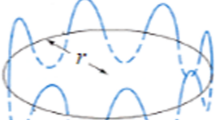Abstract
The working assumption of this paper is that noncommuting variables are irreducibly interdependent. The logic of such dependence relations is the author's independence-friendly (IF) logic, extended by adding to it sentence-initial contradictory negation ¬ over and above the dual (strong) negation ∼. Then in a Hilbert space ∼ turns out to express orthocomplementation. This can be extended to any logical space, which makes it possible to define the dimension of a logical space. The received Birkhoff and von Neumann “quantum logic” can be interpreted by taking their “disjunction” to be ¬(∼A & ∼B). Their logic can thus be mapped into a Boolean structure to which an additional operator ∼ has been added.
Similar content being viewed by others
REFERENCES
Albert, D. Z. (1992): Quantum Mechanics and Experience, Harvard University Press, Cambridge.
Birkhoff, G. and von Neumann, J. (1936): The logic of quantum mechanics, Ann. of Math. 37, 823–843. Reprinted in Hooker (1975–1979), Vol. 1, pp. 1–26.
Bub, J. (1997): Interpreting the Quantum World, Cambridge University Press, Cambridge.
Gibbins, P. (1987): Particles and Paradoxes: The Limits of Quantum Logic, Cambridge University Press, Cambridge.
Hintikka, J. (forthcoming): The problem of quantization and independence-friendly logic.
Hintikka, J. (1998): Truth definitions, Skolem functions, and axiomatic set theory, Bull. Symbolic Logic 4, 303–337.
Hintikka, J. (1996): The Principles of Mathematics Revisited, Cambridge University Press, Cambridge.
Hintikka, J. and Sandu, G. (1997): Game-theoretical semantics, in J. van Benthem and A. ter Meulen (eds.), Handbook of Logic and Language, Elsevier, Amsterdam, pp. 361–410.
Hooker, C. A. (ed.) (1975–79): The Logico-Algebraic Approach to Quantum Mechanics, Vols. 1–2, D. Reidel, Dordrecht.
Hughes, R. I. G. (1989): The Structure and Interpretation of Quantum Mechanics, Harvard University Press, Cambridge.
Jonsson, B. and Tarski, A. (1951): Boolean algebras with operators, Part I, Amer. J. Math. 73, 891–939.
Omnes, R. (1994): The Interpretation of Quantum Mechanics, Princeton University Press, Princeton.
Putnam, H. (1979): Is logic empirical?, in Hooker (1975–79, Vol. 2, pp. 181–186).
Rédei, M. (1998): Quantum Logic in Algebraic Approach, Kluwer Academic Publishers, Dordrecht.
Rédei, M. (1999): 'Unsolved problems in mathematics': J. von Neumann's address to the International Congress of Mathematicians, Amsterdam, September 2–9, 1954, Math. Intelligencer 21(4), 7–12.
Scott, D. and Krauss, P. (1966): Assigning probabilities to logical formulas, in J. Hintikka and P. Suppes (eds.), Aspects of Inductive Logic, North-Holland, Amsterdam, pp. 219–264.
Stachel, J. (1983): Do quanta need a new logic?, in R. G. Colodny (ed.), From Quarks to Quasars: Philosophical Problems of Modern Physics, University of Pittsburgh Press, pp. 229–347.
Von Neumann, J. (1955): Mathematical Foundations for Quantum Mechanics, Princeton University Press, Princeton.
Author information
Authors and Affiliations
Rights and permissions
About this article
Cite this article
Hintikka, J. Quantum Logic as a Fragment of Independence-Friendly Logic. Journal of Philosophical Logic 31, 197–209 (2002). https://doi.org/10.1023/A:1015742824326
Issue Date:
DOI: https://doi.org/10.1023/A:1015742824326



